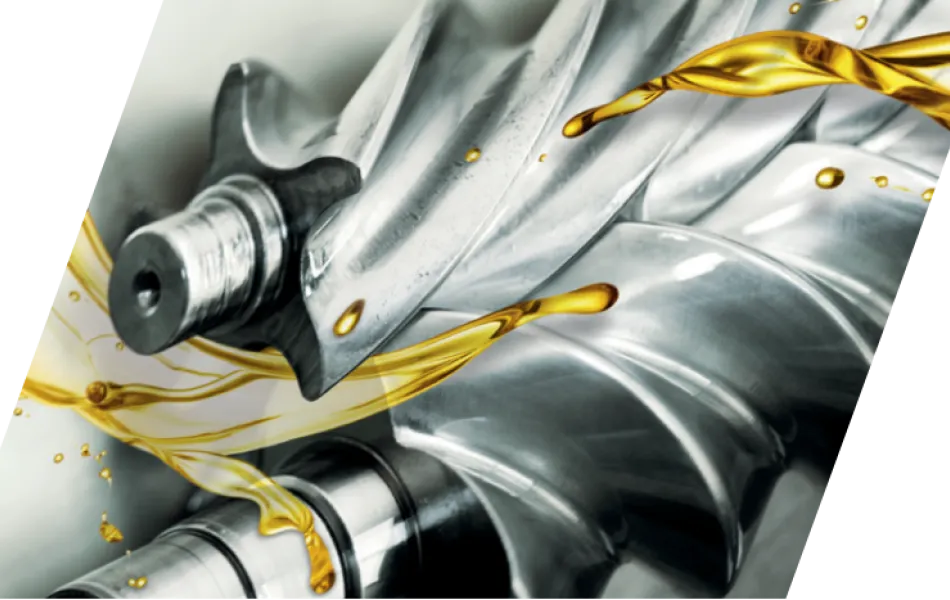Lubricant from Klüber Lubrication

Availability and efficiency in continuous operation
Erdinger Weißbräu as a family-run company has successfully established
itself on the
international beverage market with its traditional Bavarian art of brewing. The quality
and taste of the wheat beer specialties are just as
responsible for this as modern and highly available
production technology. Every detail counts, as shown not
least by the selection of the right lubricant for the refrigeration compressors.
The Erdinger wheat beer brand has been internationally
known for decades. Total annual sales are 1.5 million
hectoliters of beer. This makes Weißbräu Werner Brombach
GmbH the largest German family-owned wheat beer brewery.
And yet every single bottle is still
brewed in Erding, just outside Munich. Nothing has changed since the founding
of the private brewery more than 130 years ago.
The technical equipment of the traditional brewery
is continuously adapted to the latest production standards
. For example, a new bottling plant went
into operation in 2017, which
increased the capacity to up to 165,000 bottles per hour. And refrigeration technology
has also changed: While refrigeration compressors were
only just invented when Erdinger was founded in 1886, today they form
the indispensable heart of production. The availability
and energy efficiency of the chillers therefore
generally have a very high priority in the food industry.
Lubricants play an important role
The main reason for using ammonia as
a refrigerant is its high cost-effectiveness: its very good
thermodynamic properties make it possible
to build enormously energy-efficient refrigeration systems. Ammonia has no
ozone depletion potential and does not contribute to the greenhouse effect.
This enables sustainable cooling operation.
In addition, the importance of the
lubricant used in the compressor also becomes clear: the refrigeration oil in the piston
compressor has the task of lubricating bearings and components that move against each other, such as e.g. B. crankshaft or piston to
lubricate, seal and cool.
The oil (in the form of vapor and droplets) entrained from the compression chamber of the compressor
cannot be completely separated by the oil separator and thus enters
the refrigeration circuit. There, at the prevailing temperatures (from -35 °C to 130 °C), the oil comes into contact
with both liquid
and vaporous ammonia and
can cause the following problems:
- Black coloring of the oil due to chemical reactions between oil and ammonia
- Clogging of the oil filters
- Black, rubber-like deposits, especially on hot spots such as in the compressor and condenser (thus poor heat transfer)
- sealing problems
- short oil change intervals due to rapid oil aging
- Increase in viscosity due to evaporation of low-boiling oil components
- High oil entry in the refrigeration circuit (evaporation of low-boiling components), which means that the oil traps need to be emptied more frequently and oil consumption is high
- component wear
- Waxy deposits in the evaporator, which is cold down to -35 °C
One of the main causes of the problems mentioned is
the reaction of the refrigeration oil with ammonia, which is
introduced into the refrigeration circuit through evaporation and oil throwing
. The oil consumption of the system depends on the solubility,
evaporation stability and efficiency of the oil separator.
Depending on the formulation , the evaporation rate of naphthenic oils can
be higher than that of highly refined
mineral oils such as Klüber Summit RHT 68, which
can reduce oil consumption.
Many untreated mineral oils can contain components
that reduce the chemical and thermal stability of the oil
(e.g. unsaturated substances containing sulfur and oxygen,
which accelerate the aging process and
can lead to the formation of residues). If ammonia comes into
contact with these oils, this can lead to the problems mentioned above such as
blackening, deposits, filter problems and short
oil change intervals.
Cooperation at eye level
With these good arguments, the Erdinger wheat beer experts decided
about 15 years ago to
switch to Klüber Summit RHT 68 from Klüber
Lubrication - the beginning of a long-term partnership between
two market leaders and specialists in their fields. Based on
their experience, the practitioners confirm above all a much
lower oil throw and an improved service life of the
mechanical seals. In addition, the de-oiling process is
now easier because the oil comes out of the system much cleaner and more fluid.
Ammonia-specific refrigeration oils from the product portfolio of
Klüber Lubrication are also used worldwide in many other plants and sectors – today and in the future.




